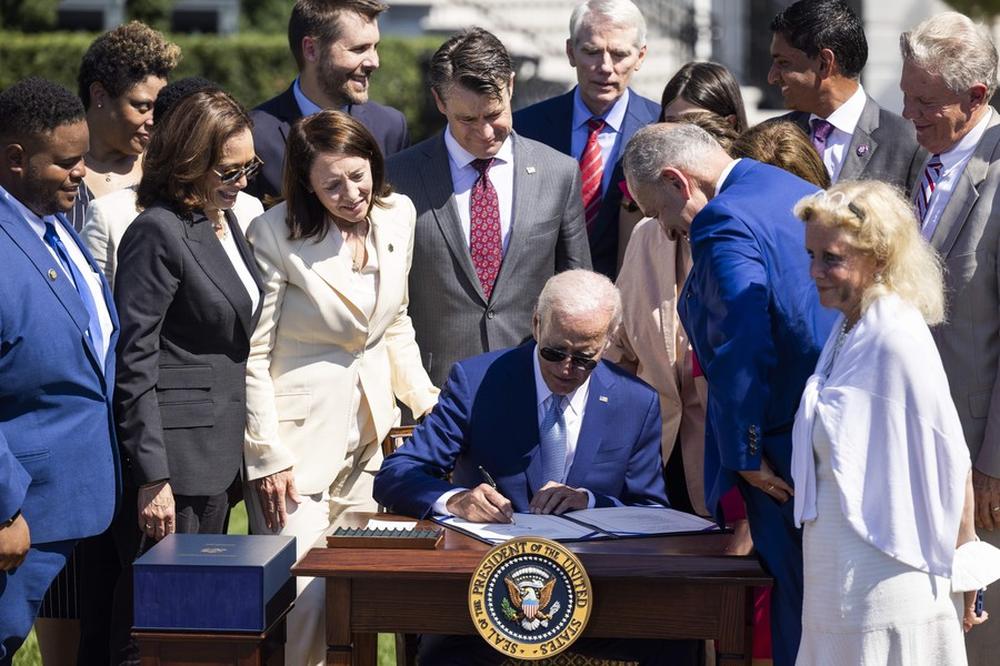- #China
- #South Korea
- #Technology & Cybersecurity
- #US Foreign Policy

►The Biden administration has proposed a semiconductor supply chain alliance known as "Chip 4" between the United States, South Korea, Japan, and Taiwan, four countries with a comparative advantage in the semiconductor industry value chain. This article first examines the strategic focus of both the United States and China on semiconductors and China's response to the formation of Chip 4. Then, the article will explore the policy responses South Korea should take.
►Although American companies dominate key nodes in semiconductor production networks, with semiconductor manufacturing capacities disproportionately concentrated in South Korea and Taiwan, it appears that the U.S. is ensuring a stable supply of semiconductors by promoting semiconductor reshoring and ally-shoring to the United States and by promoting supply stability and the establishment of a clean network through the formation of Chip 4.
►China's strategic focus, on the other hand, appears to be on securing a stable supply of semiconductors while increasing semiconductor self-reliance. In June 2014, through the "Guidelines to Promote the National Integrated Circuit Industry," China began earnestly promoting an industrial policy for semiconductor self-reliance, and to this end, strove to cultivate the semiconductor industry through the operation of the semiconductor Big Fund.
The Biden administration has proposed a semiconductor supply chain alliance known as "Chip 4" between the United States, South Korea, Japan, and Taiwan, four countries with a comparative advantage in the semiconductor industry value chain. Because China is the largest semiconductor market, there is growing public opinion that Korea, which has a technological and market advantage in the semiconductor memory sector, should be cautious about joining Chip 4. To reflect on what choice Korea should make in this context, this article first examines the strategic focus of both the United States and China on semiconductors and China's response to the formation of Chip 4. Then, the article will explore the policy responses South Korea should take.
The United States has two main strategic focuses in the field of semiconductors. First, as shown by the shortage of automotive semiconductors after 2020, the U.S. aims to secure a stable semiconductor supply method. Second, through the development of advanced military technology like drones and unmanned submarines, the U.S. aims to secure cutting-edge semiconductor technology to promote the Third Offset Strategy to secure a military advantage over China and build a clean network for cutting-edge semiconductor technology. Although American companies dominate key nodes in semiconductor production networks, with semiconductor manufacturing capacities disproportionately concentrated in South Korea and Taiwan, it appears that the U.S. is ensuring a stable supply of semiconductors by promoting semiconductor reshoring and ally-shoring to the United States and by promoting supply stability and the establishment of a clean network through the formation of Chip 4.
China's strategic focus, on the other hand, appears to be on securing a stable supply of semiconductors while increasing semiconductor self-reliance. In June 2014, through the "Guidelines to Promote the National Integrated Circuit Industry," China began earnestly promoting an industrial policy for semiconductor self-reliance, and to this end, strove to cultivate the semiconductor industry through the operation of the semiconductor Big Fund. However, China’s anti-corruption watchdog is currently investigating the recent large-scale corruption scandal related to the operation of the semiconductor Big Fund, and the fund's key figures, including the Minister of Industry and Information Technology, whose ministry oversees the semiconductor industry; the head of the fund's operation; and the former chair of Tsinghua Unigroup, which was the main beneficiary of the fund, are under investigation for alleged corruption. Since 2015, China has been spending more foreign currency on semiconductor imports than on crude oil imports. In this context, semiconductor self-reliance is an urgent task for China, but the semiconductor Big Fund corruption scandal is demonstrating that semiconductor self-reliance efforts are not well going according to plan.
What is China’s reaction to the formation of "Chip 4"? Spokespeople for China's Ministry of Foreign Affairs and Ministry of Commerce have criticized the U.S., stating that its actions are "undermining international trade rules and splitting the global market," and they are sending a message to countries involved in Chip 4, stating, "We hope relevant parties will uphold objective and fair positions, bear in mind their own long-term interests and the principle of a fair and just market, and do more to ensure the stability of the global chip industrial chain and supply chain." Regarding the future of Chip 4, Chinese media have predicted that the alliance, which excludes China, is unlikely to secure the common interests necessary to be sustainable and that the allied countries and companies will struggle to succeed due to fierce competition. In addition, regarding Korea's participation in the alliance, Chinese media have reported that because Korean officials have used the term "semiconductor supply chain cooperation dialogue" rather than "Chip 4," they are expecting South Korea to take a balancing role. In contrast to reports in the Korean media stating that China will resume the economic retaliation that was carried out following THAAD deployment if Korea joins "Chip 4," in Chinese media, Korea's participation in Chip 4 is presented as an inevitable outcome and the result of U.S. pressure. In addition, rather than bringing up economic retaliation against South Korea, Chinese media is more concerned that South Korea's participation in Chip 4 may have a negative impact on the stable domestic supply of semiconductors that China needs. For example, in response to the statement that Korea should "develop strategies such as export diversification to prevent China from weaponizing Korea's dependence on exports to China" in a report prepared by the Korea Chamber of Commerce and Industry (KCCI) in August 2022 reflecting on the 30th anniversary of the establishment of South Korea-China diplomatic relations, China's Global Times reacted strongly, stating, "Does this mean Korea will reduce semiconductor exports to China?". This suggests that, along with consuming less foreign currency, China's urgent mission is to secure a stable supply of semiconductors. Ultimately, as evidenced by the fraud investigation of the semiconductor Big Fund, with semiconductor self-sufficiency through "semiconductor rise" falling below targets, rather than taking an aggressive response to U.S. semiconductor sanctions, China is focused on securing a stable supply source for domestic semiconductor demand.
What should South Korea's policy response be to the "Chip 4" proposal by the United States? Considering that the U.S. controls the main nodes of semiconductor production networks, and intellectual property rights are operated under the U.S. judicial system, joining "Chip 4" is not a matter of choice, but of necessity. Looking back at the U.S.-Japan semiconductor dispute in the 1980s, separating from the U.S.-led semiconductor ecosystem could mean giving up on semiconductor production in the long run. Assuming that Korea joins "Chip 4," what policies should Korea put forward? First, considering that China is the largest consumer of not only Korean memory chips but semiconductors overall, a risk management mechanism should be established at the multilateral level to manage risk if China enacts economic retaliation against individual member states for participating in the multilateral forum known as Chip 4. China is also the largest revenue source for most American semiconductor companies, including EDA tools providers ARM, Cadence, and Synopsis; equipment manufacturers Applied Materials, KLA, and Lam Research; telecommunications chip manufacturer Qualcomm; and Intel. It is necessary to discuss joint measures to counteract the loss of revenue that will likely result from forming Chip 4. Second, because Chip 4 is a multilateral forum consisting of four countries with specialized areas - U.S. (technology), Japan (materials), Korea (memory chips), and Taiwan (foundry) to ensure a stable supply of semiconductors, it is necessary to create a multilateral mechanism to remove factors that impede effective cooperation between member states, such as Japan's exclusion of Korea from its whitelist. Considering that the exclusion from Japan's whitelist resulted in Korea's increased dependence on semiconductor materials from China, a multilateral mechanism should be established to remove barriers to trade and cooperation between Chip 4 member states. Lastly, the formation of Chip 4 is not meant to restrict exports to China of semiconductor materials, technologies, equipment, and products that have limited potential for military use. Given that China is the largest semiconductor market for most businesses at key nodes in the semiconductor value chain, it is not realistic to place sanctions on exports to China of semiconductor value chains with limited military application, and it could lead to a massive backlash from the companies affected. Considering this, Korea should actively negotiate for the export of Korean memory semiconductors with limited military application to China and the smooth operation of Samsung and SK Hynix semiconductor plants in China. Through this, Korea must ensure that China understands that Korea's participation in Chip 4 will not negatively impact semiconductor supply in the future.
Yongshin KIM is an Assistant Professor in the Department of China Studies at Inha University, Incheon, South Korea. Previously, he was an assistant professor in the Department of Chinese Commerce and Finance at Sejong University. He received his Ph.D. in political science from the University of Hawai‘i at Mānoa. He was the first cohort fellow of the New China Study Program, which is the Chinese government-established scholarship program to support young foreign China scholars researching China in-depth. He has also studied and researched various Chinese universities, such as Peking University, Nankai University, China Foreign Affairs University, Dongbei University of Finance and Economics, Chinese University of Hong Kong, etc. His research interests include China's politics and political economy, international relations of East Asian countries, and comparative institutional analysis. His recent works have been published in journals such as Korean Political Science Review, Pacific Focus, The Pacific Review, and China: An International Journal, among others.

